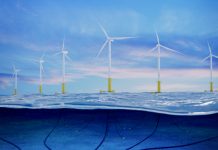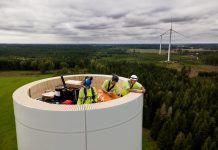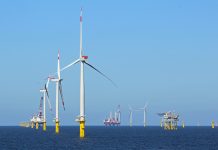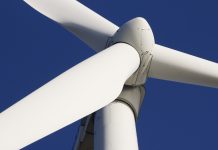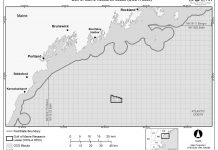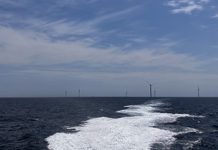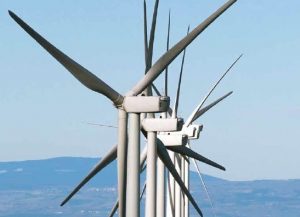A Colorado-based research team recently completed a major wind study using Second Wind’s Triton® Sonic Wind Profiler to learn more about one of wind power’s biggest unknowns, the wake effect, and its impact on turbine productivity. Triton is one of several remote sensing technologies that TWICS (the Turbine Wake and Inflow Characterization Study) has used to create a detailed 3D model of the turbulence caused when wind passes over rotating turbine blades. Turbulence can damage turbines downstream and undermine productivity. The project’s goal is to understand how to enhance wind farms’ productivity. Turbine inflow and wake observations will be integrated into a wind energy forecasting model. Understanding how gusts and rapid changes in wind direction affect turbine operations will enable turbine manufacturers to improve design standards and increase efficiency, which will ultimately reduce the cost of energy.
The study is aimed at capturing turbulence and other wake effects in a broad wedge of air up to 7km (4.3 miles) long and 1km (3,280 feet) high in front of and behind a multi-MW wind turbine. Triton, along with tower-mounted sensors and other remote sensing systems, profiles the winds in front of and behind a 130-meter high wind turbine located at the National Renewable Energy Laboratory’s (NREL’s) National Wind Technology center near Boulder, Colorado. NREL, the University of Colorado at Boulder, the Cooperative Institute for Research in Environmental Sciences (CIRES), and the National Oceanic and Atmospheric Administration (NOAA) have teamed up to conduct the study.
“The NREL site is prone to complicated wind patterns, so we needed several remote sensing instruments. The site is flat, but it’s located just five kilometers from El Dorado Canyon on Colorado’s Front Range and the canyon funnels air into the site,” says Julie Lundquist, assistant professor of atmospheric and oceanic sciences at the University of Colorado at Boulder. “The Triton is a good instrument for this study. It will provide us with anchor points in the study by profiling selected slices of a larger wedge of the atmosphere over a long period of time.”
Triton is an advanced remote sensing system that uses sodar (sound detection and ranging) technology to measure wind in the areas that most affect a wind turbine’s performance. By measuring wind speeds at the turbine rotor’s hub height and beyond, Triton reduces uncertainty in annual energy production (AEP) forecasts. Easy to install and capable of autonomous operation, Tritons are being used throughout the wind industry, alone or in conjunction with met towers, to streamline the wind farm development process and to improve wind farm operations.
“Turbine wake effects are a huge unknown in the wind industry. To fully realize the potential of wind energy, with large-scale wind farms, we need to know how turbulence from one turbine affects those around it,” says Second Wind CEO Larry Letteney. “We’re confident that Triton will make a significant contribution to understanding wind farm conditions, which will lead to a more productive and efficient wind power industry.”
Second Wind provides the wind energy industry with the intelligence required to plan, finance and operate highly efficient, profitable wind generation facilities. Learn more at www.secondwind.com.



